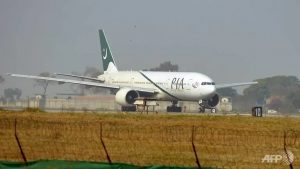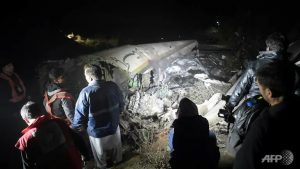
Pakistan International Airlines (PIA) is under fire as a pilot licence scandal unfolds, and some industry experts wonder if the carrier can survive the fallout.
ISLAMABAD: Pakistan’s national airline is taking heavy flak after it emerged that nearly a third of its pilots were holding fake or dubious licences, with some observers wondering if the struggling national carrier can survive the scandal.
Pakistan International Airlines (PIA) this week said it would immediately ground 141 of its 434 pilots after a government review found them to have obtained “bogus” credentials or cheated on exams by having someone else take them.
The scandal comes in the wake of a crash in Karachi last month that killed 98 people – and which authorities have essentially blamed on the two pilots.
Investigators said the aviators were chatting about the coronavirus while they attempted to land the Airbus A320 without putting its wheels down, catastrophically damaging the engines.
The plane lost power and plunged into houses near the airport as it went around for a second landing attempt.
According to a government review last year, details of which were revealed on Thursday, 262 of Pakistan’s 860 active pilots hold fake licenses or cheated on exams.
More than half of them were from state-run PIA.
Until the 1970s, Pakistan’s largest airline was considered a top regional carrier but its reputation plummeted amid chronic mismanagement, frequent cancellations and financial woes.
So far, authorities have started dismissal proceedings against 28 of the 262 pilots and subsequent criminal charges are likely, Pakistan’s aviation minister Ghulam Sarwar Khan said on Friday.
PIA will bring reforms aimed at restructuring the airline, he told reporters, adding the “clean-up process” should be completed by the end of the year.
“People are saying this (revelation) will have a negative impact. But when you try to save a patient, you have to do major surgery, radiation – and even chemo,” the minister told a press conference.
He sought to blame PIA’s problems on “the wrongdoings of previous governments”.
“God willing, 2021 will be the year of the betterment of Pakistan’s institutions and, God willing, PIA will become the PIA of good times – the 1960s, ’70s and ’80s”.
‘TARNISHED’ IMAGE
But several observers did not share the optimism, and doubt whether the public will trust any promised reforms.
The scandal will “prove the last nail in the coffin of PIA,” predicted Ijaz Haroon, who was managing director at the airline until he resigned in 2011 amid a union protest.
“The world is not going to trust us anymore. No one would like to fly with pilots who have bogus licenses. (Khan’s) statement has further tarnished the image of the airline”.
Shahzad Chaudry, a retired Pakistan air force air vice marshal, said the government was unfairly scapegoating PIA, as it is Pakistan’s Civil Aviation Authority that issues licenses.
“We not only need a complete overhauling of PIA but CAA as well, as both go hand in hand,” Chaudry told AFP.
The government said Friday it had suspended five CAA officials in the scandal.
PIA, which is helmed by a serving air force officer, currently has a fleet of 31 planes and a payroll of about 14,500 workers.
The high staff-to-plane ratio has seen long-standing accusations the government and the military use the airline to dish out jobs to cronies and retired military officers.
“The current PIA economic model is under the vested interests of political parties and different pressure groups,” Chaudry said.
“No airline has 500 staff per aircraft. Our economic model right from the foundation is unsustainable.”
Three current PIA pilots who spoke to AFP on condition of anonymity outlined a series of issues, including pilots being forced to work lengthy shifts of up to 24 hours.
A PIA spokesman said there was “no such case”.
Pakistan has a chequered military and civilian aviation safety record, with frequent plane and helicopter crashes over the years.

In 2016, a PIA plane burst into flames after one of its two turboprop engines failed while flying from the remote north to Islamabad, killing more than 40 people.
In 2016, a PIA plane burst into flames after one of its two turboprop engines failed during a flight from the remote north to Islamabad, killing more than 40 people.
Qasim Qadir, the joint secretary at the Pakistan Airline Pilot Association, called for a transparent and thorough final investigation into the May 22 Karachi crash that killed all but two of the 99 people aboard and a child on the ground.
“Blaming (the pilots) is one thing but … we want the system to become safer for us and the passengers. So please make it a fair investigation,” Qadir said.

